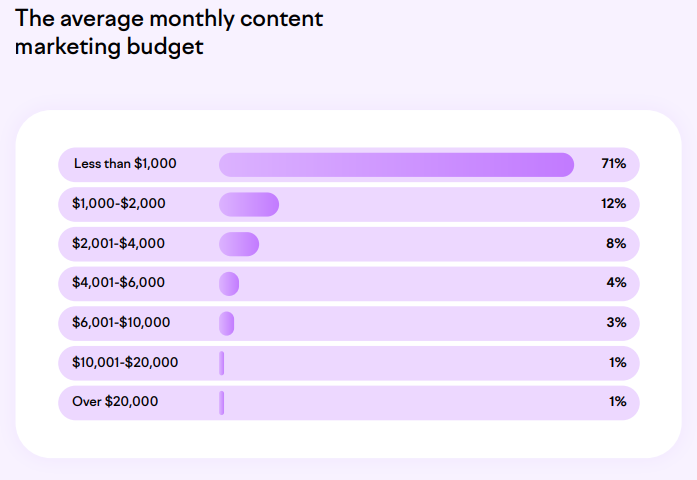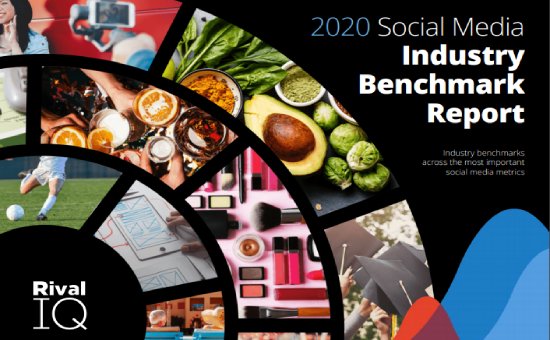Think Big with AI: Small Business Content Marketing in 2024 | Good Content
Artificial Intelligence
|
Warning: Undefined array key 0 in /home/dmc/public_html/wp-content/themes/DMC/single-report.php on line 21
Warning: Attempt to read property "name" on null in /home/dmc/public_html/wp-content/themes/DMC/single-report.php on line 21
Picture yourself competing head-to-head with industry giants, leveling the playing field. The struggle for organic traffic fades as your website ascends the rankings, captivating your audience. While big brands historically dominated content marketing, AI now empowers smaller businesses to enhance SEO, craft superior content strategies, and achieve substantial outcomes.
Part One: Industry Survey Overview
During 2023, we conducted a survey encompassing over 2,600 businesses worldwide, spanning diverse industries. The objective was to ascertain the adoption of AI in content marketing and SEO, exploring its utilization and efficacy.
Who Did We Talk to?
Among our survey participants, 47% represented micro-businesses (1-9 employees), while 30% hailed from small businesses (10-49 employees). Thus, a significant 76% belonged to companies with fewer than 50 employees. Over half, comprising 55%, identified themselves as business owners or founders. Following this group, marketing managers constituted 11%, trailed by CEOs at 8%. The remainder held various marketing roles like content marketing manager, social media manager, and marketing director.
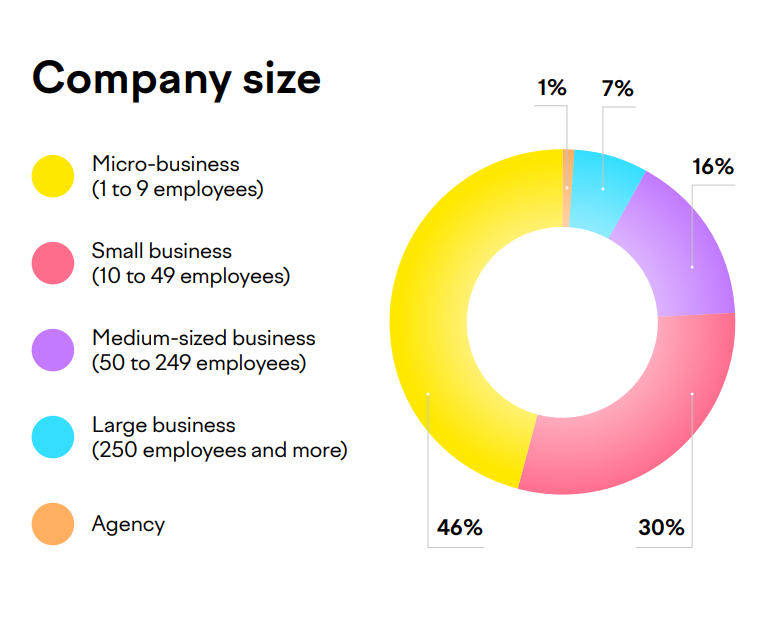
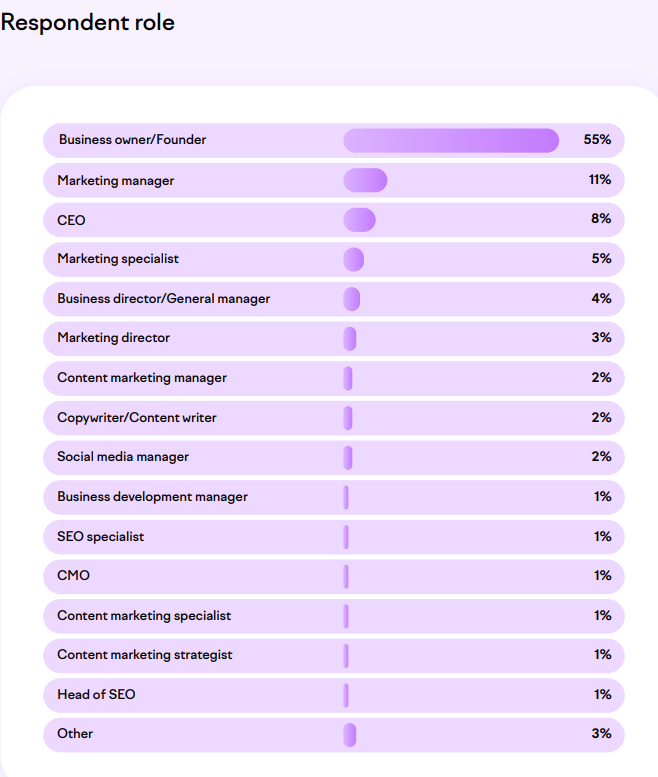

Businesses That Don’t Use AI for Content:
Key Insights
Initially, we sought to understand the reasons behind the decision of individuals not to utilize AI tools in their content marketing or SEO endeavors. Interestingly, 35% indicated unawareness of this option. However, among the 65% cognizant of AI tools, yet not leveraging them, 37% cited a deficiency in training or comprehension regarding their optimal utilization. Additionally, 31% expressed concerns regarding the originality of outcomes, while 30% voiced apprehensions about quality.
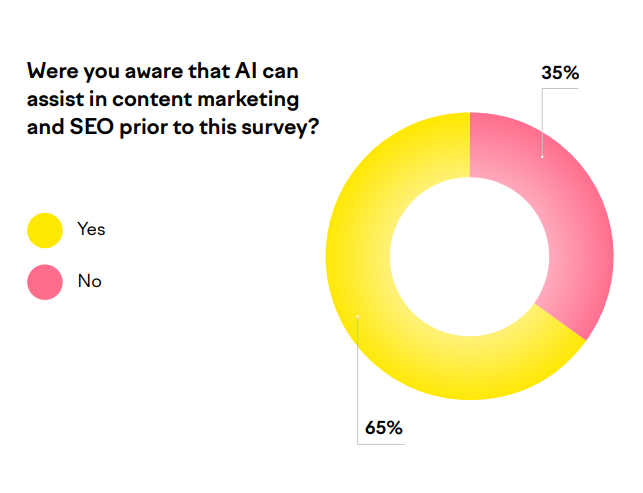
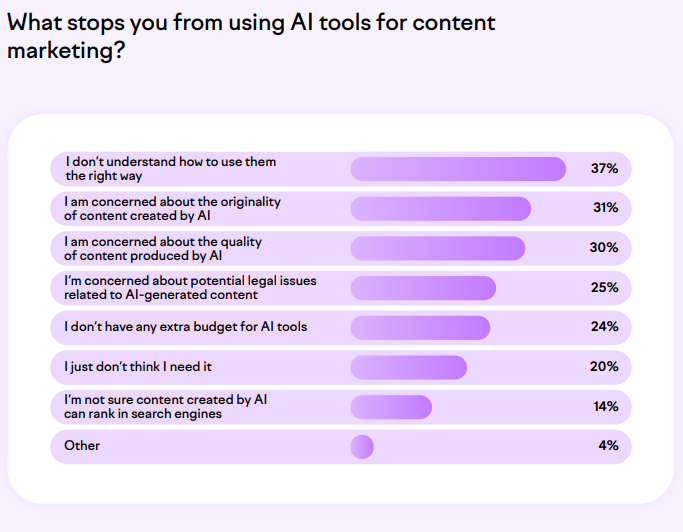
How Content Marketing Performs Without AI
Now, let’s delve into performance metrics concerning businesses not utilizing AI in their content marketing. Approximately half (49%) perceive their content marketing endeavors as effective or highly effective. Conversely, a substantial proportion (43%) regard their efforts as merely average, with 11% deeming them ineffective. Similar patterns emerge in assessments of their ability to rank and attract organic traffic through SEO. Merely 9% regard their SEO efforts as highly effective, while the majority (46%) assess them as average.


How Content Marketers Produce Content Without AI
In smaller marketing teams with limited budgets, the bulk of content creation is handled internally. Almost 80% indicated they personally craft the content. Additionally, 17% rely on an in-house writer, while 14% collaborate with freelancers. When examining the duration required for crafting long-form content such as blog articles, 40% complete the task swiftly, within an hour. Another 38% allocate 2-3 hours for this type of writing.
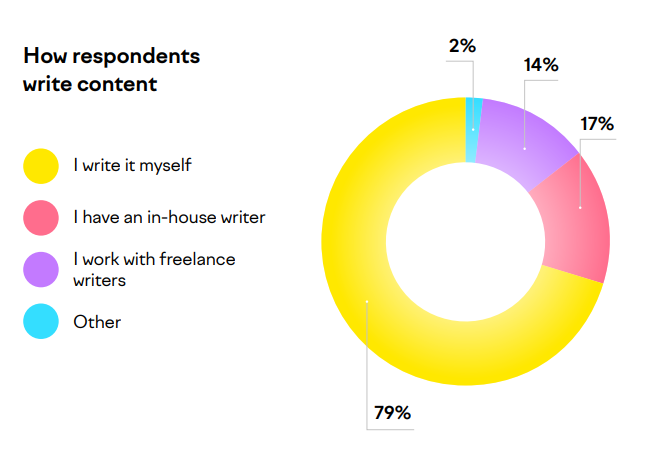


Budgets and Content Production Costs Without AI
Among the one-third of participants who refrain from utilizing AI in content creation, 71% allocate a monthly budget of less than $1,000 for content marketing. Only 12% designate a budget ranging from $1,000 to $2,000. Few respondents surpass this expenditure. Delving into the expenses for individual items like long-form content, the breakdown is as follows:
Dive deeper into the insights and trends shaping small business content marketing in 2024. Gain valuable knowledge and strategies by continuing to read the full report. Download now to stay ahead in your content marketing game!
The Table of Contents of “Small Business Content Marketing in 2024” Report :
- Part One: Industry Survey Overview
- Part Two: Content Marketing and AI Trends for 2024
- Part Three: Humans Go Head to Head Against AI Writers
- Part Four: The AI Prompts Library for Content Marketing and SEO
Number of Pages:
- 148 pages
Pricing:
- Free
Methodology
This research was carried out by a data scientist, a content strategist, and AI—all working together.
We started by listing key categories for AI prompts.
We then had several rounds of generating prompt ideas, testing the results, and repeating this process until we got the desired results.
We manually checked dozens of texts to come up with tips for writing the prompts.
Finally, we created an extensive prompt library for each category and made sure these prompts can help you get the best results, in the easiest way possible.
Warning: Undefined array key "sidebar_ads" in /home/dmc/public_html/wp-content/themes/DMC/functions/helpers.php on line 824
